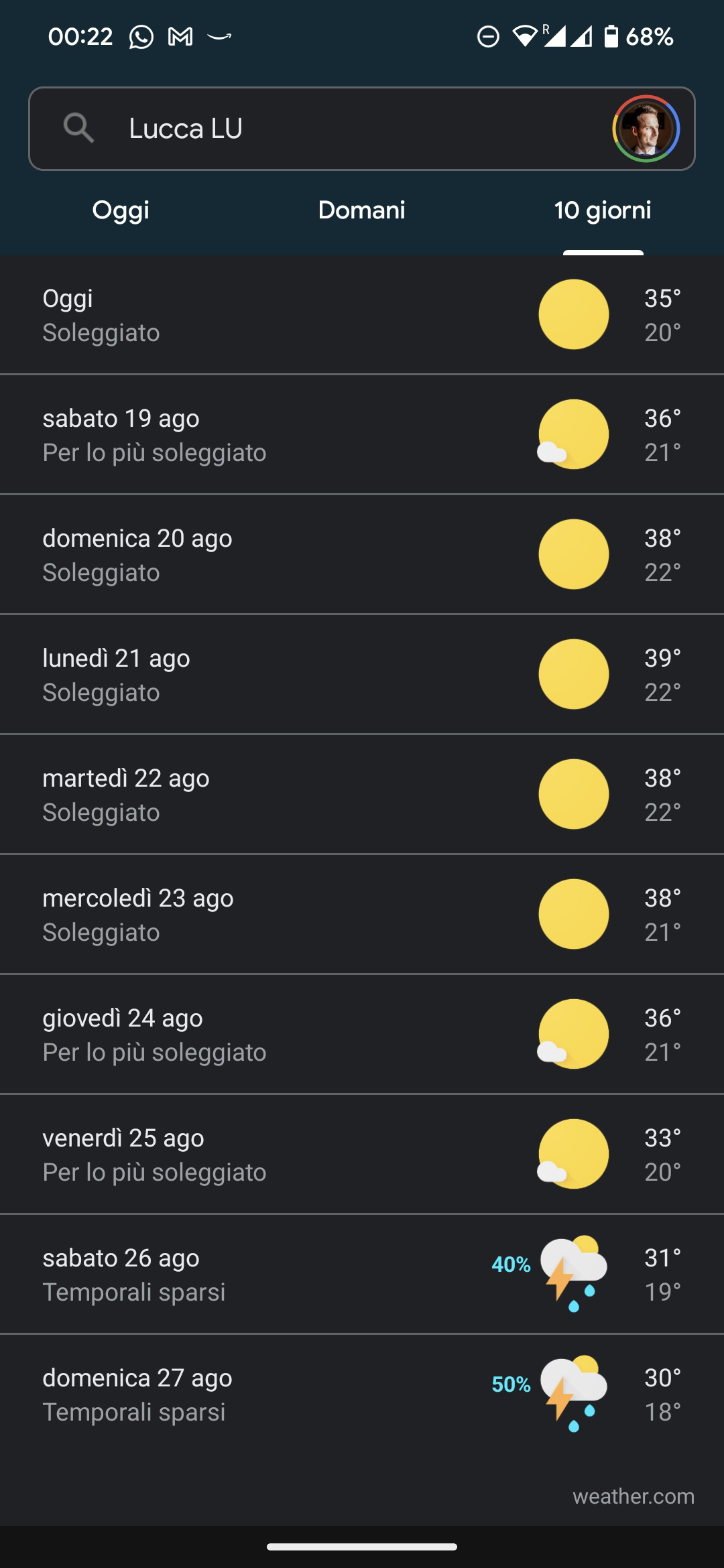Because for most of Europe, it wasn’t needed to have AC up until more recent years. You would have maybe what? 5-10 days a year that were actually really warm. People wouldn’t install an AC for that.
These numbers will drastically change the coming decades.
These numbers will drastically change the coming decades
which will only make things worse, since AC just moves all the heat from indoors, out, and uses energy to work of course.
What we really need is builders to start taking the extra heat in to account and designing accordingly (there are loads of different ways to physically control the temperature of a space instead of mechanically).
Shame that’ll never actually happen…Can you elaborate on that? European housing is built with a lot of focus on insulation and heat control, what are you referring to?
European housing is built with a lot of focus on insulation and heat control
It’s more about also keeping heat out, as well as heat in. Which have overlap but are not necessarily the same thing. See this conversation for some more details.
Buildings with all glass façades are an insulation nightmare. Cities need more water, plants and trees. Houses need can be built to favour shadow and fressness. You can even go anciant design that were naturally cooled and winded, like roman or African houses.
I don’t know about other European countries, but France housing is a disaster the last 40 years. It’s only been a decade at best that insulation is a consideration, but the quality is quite bad.
The big change that needs to happen soon is passive heat blocking for personal residences.
Most HOAs don’t allow a big extra wooden structure over the roof to block the sun; but they’re going to need to start to keep home prices up.
But HOAs are designed to make rule changes almost impossible. So I predict we’re going to see a lot of expensive neighborhoods become cheap ones in the next 15 years, due to their HOA not fkexing to support necessary heat control structures.
Overall it’s still going to be a net saving as people switch from electric/gas heat to heat pumps and AC is just those but running in reverse.
And, of course, insulation. The reason we got away without AC is due to generally very large thermal mass of the exterior, you shutter everything in the morning to keep the heat out and when the temperatures drop again you open everything and let the air cool everything down. Thing is: In those recent waves there were plenty of nights where the temperature didn’t really drop.
That’s not true. While Northern Europe doesn’t really need aircon, Southern Europe is pretty bloody hot since the days of Christ. The difference is that European houses are built with insulation in mind, US houses are built from sticks and shit.
The insulation requirements in the US are higher than many European areas with similar climates. Germany for instance would fall in region 4 and 5 of the US climate wise. R-30 is required for walls, R60 for ceilings, and R20 for floors for homes in the US. Germany recommends 6cm of wall insulation ~R8, 14cm for ceiling ~R19, and 6cm for the floor R8.
___You know if you muppets used sane units you’d be right. But you’re using colonial measurements.
Here’s conversion table. US R30 is equivalent to proper units R5.3, R60 is R10.5.
…and we don’t really have recommendations as such. KfW55 is nowadays mandatory for new construction, KfW70 and up gets you cheap loans. KfW70 means less than 45 kWh/m² per year for heating and they don’t really care how you achieve that. We didn’t really get around yet factoring cooling into stuff.
I was using freedom units for both. The R values were determined based on insulation thickness. Because you Europeans use energy consumption for your requirements it’s impossible to compare with US requirements. I did find this table giving recommendations for insulation.
Not saying that is the case, but 20% of Europeans with A/C could also mean that 100% of the people in the very south have it and noone else.
You’re also wrong. Mainly, It has to do with the thermal capacity/mass of the building and not with differences in insulation values.
There are pros and cons for all building types.
I’m not wrong, sorry.
Southern Italy peaks at 32C and low humidity. That is absolutely nowhere close to the heat we get in much of the US.
US houses are most definitely built with insulation in mind. That point is somehow more laughable than you not knowing your own temps.
Literally every part of your claim is incorrect.
Dude, I’m in Tuscany which is nowhere near the peaks of southern Italy.
This is what awaits me

This matches my expectations pretty well
Your houses would be built with the same materials if you had the earthquakes and tornadoes to deal with.
No.
I said most of Europe, not all of Europe.
I’m well aware that AC is common to have in the south but then you’re talking about like 4 countries. Once you move north of those, it’s not all that common to have an AC in the house.
Especially since some people are pushing for lower regulations on how to build houses in some countries in Europe. Yes, there is a housing crisis going on. But when we start to build weaker buildings because of that, we just make other problems worse.
Also most of Europe is significantly north of the USA so…yeah. Non-story.
Actually it’s mostly due to the construction materials and techniques used. American houses are generally less well insulated and built with the explicit expectation that there will be active air conditioning used to maintain the temperature.
Meanwhile in Europe this is not only comparatively very expensive to do, it is also largely unnecessary due to many buildings predating modern air conditioning, using good insulation and passive systems to maintain a comfortable temperature. There are also regulations on newly built houses that make it generally attractive to build energy efficient.
One thing I can promise you, even if it’s not 2x4 construction, those brick and plaster walls will turn a house into an oven over the summer even with judicious control of open windows. They just store up the heat for a night time that feels like noon day sun. Folks used to straight up sleep on their porches.
Signed,
A resident of an un-air conditioned brick and plaster house in the mid Atlantic currently sweating his balls offThat’s been a problem with climate change in the UK where air conditioning doesn’t really exist but we are starting to experience warmer weather than the houses were built for.
Most British houses don’t have any insulation, that’s why they suck. Try a new build and feel the difference.
Can confirm, so long as you have cool nights and insulated houses you don’t strictly need ACs, you can get by with opening all the windows at night and closing them (and closing the curtains) during the day so the cold is trapped inside.
I live in a new build and my biggest heating bill this winter was about above £60. I only have portable air con because I WFH and my giant 4K monitors heat up to +46 and just blast that heat into my face all day long. That’s awesome during the winter as I don’t have to heat my work room at all, but during the hottest days it becomes a problem. Other parts of the home don’t need air con at all. Was OK even during last year’s heatwave.
I have a new build but it doesn’t allow the heat to escape on the heat we’ve experienced during the last couple of summers (this summer excluded).
American houses are generally less well insulated and built with the explicit expectation that there will be active air conditioning used to maintain the temperature.
Well, that’s just silly and shortsighted. A well-insulated house will maintain its temperature more efficiently and require less active temperature control.
So that sort of mindset seems pretty on point for 'murica.
Source?
There isn’t one. The latitude isn’t the only reason either; the jet stream over the Atlantic moderates the European climate. Meanwhile in places like Minnesota and Buffalo you oscillate between -30°F with 48” of snow in 24 hours in January to 100°F with 90% relative humidity in August. If construction were poor and insulation was substandard, people would die.
Most of Europe doesn’t have a/c for the same reason a lot of Seattle and SF don’t — it’s never been necessary.
The North American Insulation Manufacturers Association (NAIMA) reported that approximately 90% of U.S. single-family homes are under-insulated and are wasting energy and money
European houses are typically built with masonry, while North American houses are usually made of wood.
http://masonrydesign.blogspot.com/2014/01/european-construction-versus-north.html?m=1
Then there are some design choice difference that also matters. In the US average ceiling height is around 9 foot. In Europe it’s 11. Open floor plans are more common in the US. It’s a trend coming to Europe but given the average age of a house in Europe it’s still relatively rare.
Yes, the USA has plenty of well built houses. No one is arguing against this. And the climate plays a bigger part why most of Europe doesn’t have AC. But the statement is still true. European homes are generally built without taking an AC into consideration and are trying to fix the issues in a passive way because of it.
The USA aren’t the worst offender either. Australia has it way worse. They have some of the worst insulation and are melting during summer and freezing during winter. Despite spending an ungodly amount on cooling and heating.
I recently got all new insulation, central ac, ducts. Just getting new insulation helpped a lot but I dont how much is enough. The company just showed a chart and said this how mich is standard here. Yes it is an american home yes it is brick.
Hmm, my apartment building is mostly cinderblock and concrete, I have 12 foot ceilings, I’m on the first (above the entry) of five floors so hot air should rise away, and I have good double glazing with UV blocking film and screens. But mid-afternoon when that low-latitude Southern California sun hits, and the Santa Anas are blowing off the desert, even closing all the curtains and turning off appliances can’t keep it cool. So we set the AC for 77 and swelter until the sun goes behind the building across the street. And I make sure I get all the day’s cooking done in the morning so I’m not adding any heat. I’ve seen Europeans come and sunburn themselves because they think they know how long they can play in the sun but they haven’t met OUR sun. It’s just more direct.
The climate of Europe is a lot warmer than in America for the same latitude
wait until you learn about the gulf stream
you basically have to move Houston to Madrid for temperatures to be comparable by latitude
wait until you learn about the gulf stream
nothing we’re not about to remove from the calculation
Are you fucking high?!? 38° is a hot summer day in Europe. Thats 100.4° F. When I lived there I hated life. Mosquitoes outside my window without a screen, so a breeze was out of the question. No A/C inside so breathing was also out of the question. I eventually found reprieve in the form of a 5” fan sold to me by an old man.
Point is, celsius or fahrenheit, its fucking hot
So is Canada, but it has 64% of homes with air conditioning.
Also, maybe it’s just me, but like didn’t England, France, Spain, Italy and southern Germany all hit like 100f (38c) or higher this summer (and other summers before that)?
It’s less of a story and more a telling sign that climate change is having a direct impact on humans that it’s becoming more and more necessary for people in even European, Canadian and even PNW climates to adapt and outfit houses and businesses with them.
Southern Germany didn’t hit 38.
The main reason is how people build houses. In Europe, people use different meterials (bricks, mortar, concrete, etc.) which insulate and put on top insulation. Walls are thicker too. The good insulation keep the heat outside.
The other is the law. Europe has regulations on AC. For example, if I want AC in my house, I must compansate the electricy consumption with renewable.
You’re part right and part wrong:
While building with different materials DOES change insulation, that doesn’t mean it always makes the buildings cooler.
On the contrary, building with bricks, as is standard for all year residential buildings throughout most of Europe is a way to trap and detain heat, NOT a way to keep heat out.
You see, the greatest temperature difficulty before anthropogenic global was the outside being too COLD, so that’s what we’ve been building for and because of that, AC hasn’t been as necessary.
Nowadays though, the heat retaining structures with no AC are becoming unbearably hot for much of the year. We desperately need environmentally responsible AC.
Having lived in Germany for a year, no. It gets hot in the summer. It’s hard to concentrate while at work when there isn’t even a fan. I don’t get it. It would make economic sense for businesses like the software house I worked for, on productivity loss alone.
The average high temperature for Germany in July is 77°f
The average high temperature in the state of Georgia in July is 89°f
Haha. Average. I live here in GA and while the average may be 89 i havent seen a temp below 90 since june. Its more like a 95 average recently.
Climate change is a thing and it won’t matter how far north you are, the heat’s going to kill you.
Get some damn air conditioning.
Everyone having AC is a good way of accelerating climate change
It’s very expensive though.
And will only get more expensive.
In the last years the max temps during the summer months in southern Germany have significantly risen - often over 30 C. I just moved into a new house here that fulfills the latest energy efficiency standards (kfw55) and am surprised how well it also insulates against heat. With a recuperating air ventilation system it’s pretty bearable without active cooling.
I look after holiday properties in Europe, all new and highly insulated. I tell every guest to open their windows at night, then close everything they can during the day when they’re out. It’s how the locals have been doing it for centuries and it’s now far more effective. It’ll keep the cool air in the house as well as it keeps the heat in in winter
Tell this to 80% of guests, they have a lovely holiday
Tell it to Brits or yanks, they phone up 3 days later screeching like fuckin infants because their chalet is a boiling cauldron of flies because of course they knew better than some pesky local
Brits don’t know how to handle heat at all. We open all our windows during the day and let all the hot air in, and then complain about the house being too hot at night. We also like to open the windows on air conditioned trains and buses so we can complain about the air con not working.
It’s purely down the not understanding and not having to understand how to manage heat and that our houses are terribly insulated. We’re an island of clouds and rain.
Usually the people who live in good quality new-builds get it (Probably also cos they’re mortgaged up to the fuckin eyeballs and can’t afford to switch on the air con at home) 😂
Where i am right now it the middle of the night and 30c . not exactly letting a lot cool air in in those conditions
Still wish I had EU citizenship. Imaging getting on a train and going anywhere you want.
My life so far:
- Be born in UK, be able to work / live anywhere in EU
- Emigrate to USA to try that for a bit (can always move back to anywhere in EU if I don’t like it!)
- Brexit
- Trump
And yes, I do miss the trains.
Man, when you’re in the high 90s, with humidity in the same numbers, it doesn’t matter how high your ceilings are, how much airflow you have under the house and through the attic, it sucks. And by sucks, I mean it can kill people sometimes.
Growing up here in the south, we didn’t have AC until somewhere in the late eighties, and that was a big window unit. Most days during the summer, you had no ability to do much of anything without suffering. After the window unit, we could at least eat dinner without being nauseous from heat.
This house didn’t have central air until 2003, when I put it in after I made a small bundle selling a book. I will never fucking go back to not having it. We keep it set fairly warm unless my wife is having trouble (MS fucks your ability to thermoregulate, and getting overheated can cause problems that can last weeks), but it simply isn’t realistic to do without it.
I have no clue what Europe is like in terms of summer weather patterns. But the south has these old houses like ours that are built to make the weather as livable as possible, and they don’t really succeed any more.
If I had the money, I’d likely switch to a heat pump, but I don’t, so oh well.
And that’s not even going into the extra expenses that come without AC of some kind. You get the heat and humidity going, and mold becomes a guarantee rather than a possibility. Wood warps, and stuff like plaster or drywall don’t exactly enjoy the humidity either.
Plenty of AC in Greece, per room split units not central.
Splits with heat pumps are more efficient anyway. The fancy ones with ceiling cassettes seem easier to install and maintain too, with zonal temp controls for even better efficiency.
Sure but most of them do not have heat pumps here.
You sure, because I’m pretty sure like 90% of AC in Europe is probably heat pumps because it doesn’t make sense for them not to be. It doesn’t change the cost at all, it functions the same like if you just used cooling.
I know at least that every AC I checked here in Croatia was a heat pump.
I was probably thinking of ground heat pumps.
Everyone has AC(often more than one), but noone has any money to pay for the electricity to use the AC. So many people dont use them or only use them for a couple of hours.
Two different climates too. USA is centred closer to the equater then all of Europe, which means more people live in year round heat, and want A/C to cool off.
Right? People forget this all the time and say “just open a window you baby” bitch it’s been 100+ (37c) every day for three months here, %50 humidity minimum. Our overnight lows are your daytime temps.
Aren’t heat pumps a cleaner, better alternative to traditional AC?
Heat pumps ARE AC. Also your fridge.
And (multi-)split wall mounted ACs are among the most efficient heat pumps as well with SCOPs above 4.5. It’s frustratingly little-known or talked about (in central Europe anyway), because these devices would also be a much cheaper and more efficient heat-pump upgrade for older buildings that don’t have low temp supply-water heating and would normally need to be completely gutted to install floor heating or large radiators.
While being the cheapest, AC is also the type of heating with the least amount of comfort, while the most expensive solution, underfloor or wall heating is the best comfort. Radiant heat is much less intrusive than blowing air around violently.
That being said I think it also has its perks like the forced convection heats up a cold room much quicker and in a bathroom it assists drying surfaces or clothing on a drying rack (to stick with European customs). Meanwhile floor heating is extremely slow with some annoying side effects like it basically doesn’t react to noon sun shining into a room and heating it up or stuff like that.
But I’m not going to argue that comfort wise floor heating is far superior.
I agree. One thing I’d like to add: There are also low thermal mass floor heating systems available nowadays (usually dry, built on top of a layer of Insulation). These aren’t that slow to react. But of course, these bring not only advantages but also drawbacks.
Air Heat pumps are AC.
There are different types which uses earth or water body heat and are even more efficient but expensive.
Technology wise they are AC though
Yes. And many homes in Europe have them. US term for them are split AC systems.
The technology behind them works exactly the same, only that usually the direction of heat transport is reversed. So at least the “cleaner” part depends largely on the chemicals used, not whether it’s an AC unit or a central heat pump.
It wouldn’t surprise me if that changes over the next few years.
Gulf Stream
Gulf stream, more water around countries which evens out temperature changes, more insulation which prevents heat from getting in, more massive construction generally which also helps moderate temperature changes, and we probably have better building codes in general so stuff like ventilation doesn’t make things worse by letting the cold out.
These comment threads could use some air conditioning!
I’m in the UK and I am currently buying a house, I looked at hundreds and the one I am buying is the only one with built in AirCon, Only to 1 room though. It really is rare here, I have a portable unit but it isn’t that good, I think these are what many people have but actual built in air conditioning is in my experience very rare.
It’s expensive to add and the cost is per room… plus portable isn’t that bad for the couple of weeks of actual warm weather.
I can’t even have portable as I have no opening windows in the main room… would have to fix that first. Luckily insulation works both ways and it doesn’t really get that hot in here yet.
Huh. I’m in the 12% of something
I just sweat and let it get up to 87⁰F+ in here. I’m doing my part.
Meanwhile my friend runs her ac and then sits under a blanket in her apartment.
Been getting 87/88F in my apartment during the day. Run the AC at night tho.
It may actually be better to set your AC to a highish temp like 81-82 so that it keeps it at that level without running non stop. If the house is 89-90 it takes a very long time and uses a great deal of energy to cool the air down. Maintaining a tolerable temperature can actually help conserve energy in many cases. Obviously you do you and all systems are different but could be worth trying!
I’ve been running my mobile unit (in Germany) yesterday just to dry the air. It didn’t cool, the living room was even a bit warmer than the rest of the apartment, but it was so much better.
Jeez. I can do 83, but 87 is way to warm.
Most people’s bodies will adapt with time. 87F is where I start to noticing it being warm, where 6 months ago that would have been like 80F
deleted by creator
Oh boy… cue up all the “Grrrrr America bad!” comments.
Lets see if we can play Lemmy Anti-America Bingo…
They’ll be comments that American homes are supposedly worse quality than European ones by people that don’t understand construction or economics.
Americans are wasteful.
Someone will mention European windows.
Post from people who misunderstanding thermal mass.
Lots of people forgetting what humidity is.
Are you suggesting that the things you mention are not true? There’s probably a reason why people keep mentioning them, no?
No matter what, we are all in the climate crisis together, and everyone, including Americans, must do everything we can to make better choices when it comes to climate.
There’s probably a reason why people keep mentioning them, no?
Shouldn’t you be mentioning them to the Germans and the Swedes, since the former uses the same drywall Americans do and the latter builds with wood?
You guys have never seen a window screen before and politely assume there’s no real-world reason they’re needed here. The answer is bugs. LOTS of bugs. Diseased bugs. Putrid bugs that breed like hell. Bugs who spray you with little drops of acid. Those don’t exist where you live, so you have neat windows.
What? I live in Germany, I have window screens and the neat windows. Do you think you can’t but bug screens on a European window?
I live in the States. Well aware of the bugs. There are bugs in Europe, too. Just FYI.
But that’s not the point. Americans still have to do a lot more. A mindset change is needed when it comes to climate.
Have you ever been in a typical, modern European house?
Sadly (for the US), on average every single point on your list is true.
Just look at the places in the US hit by catastrophes. Basically, nothing but maybe foundations remain. If there is a fire, they usually add their mass to the fire instead of resisting. If a fire actually reaches a European town the damage is quite lower than what can be regularly seen of in the US.
And yes, Americans are wasteful. In so many regards, it is not funny. Living in suburbia and driving gas guzzling trucks where a normal car would more than suffice are just two examples.
European windows (and the general thermal isolation of houses in Europe) are way better at keeping cold and heat separated than even the better insulated cardboard boxes Americans call “houses”.
Do you understand Q = Cth Δ T?
And most Europeans deal better with humidity (and heat) because they are used to it.
No you’ve got your bingo card full, go home and whine.
Apparently a lot of them don’t have sliding windows with screens either. Maybe they’ll catch up on that one day.
Imagine not having double-paned tilt turn windows.
You only have two panes? Three panes is the way and the truth.
How about double pane but with a really big pane?

I can tell the Europeans are on because they’re roleplaying that those are somehow better lol. Tilt windows make no sense over sliding windows if you’re looking at it objectively.














